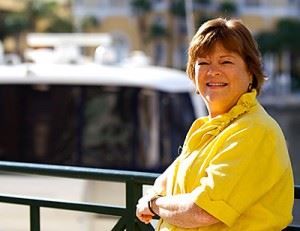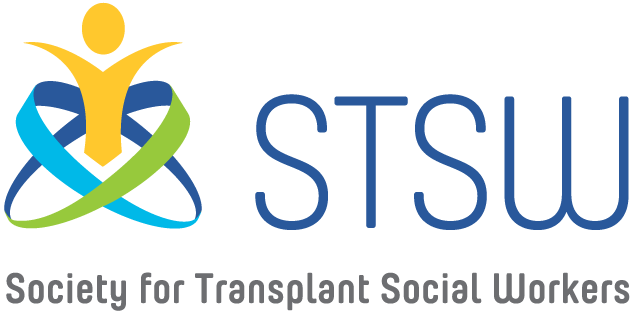Our History
By Sandy McMath LCSW CCTSW
The Society for Transplant Social Workers was founded in New York in 1985 by a visionary, Lee Suszycki. A seasoned social worker, she knew the value of support, networking, and establishing best practices. She was a visionary, gathering social workers together to define our own role on the emerging heart transplant teams across the country. She believed social workers had the expertise in clinical practice and psychosocial assessment, and therefore research and publishing in the field of transplant social work should come from our membership.
The first meeting of the National Clinical Network for Heart Transplant Social Workers, as we were then called, was held in New York City on October 17, 1986. The conference included presentations and networking, but also focused on creating the structure of this new organization. The first officers elected were: Lee H. Suszycki, President; Stav Lysandrou, Vice President; John Martinez, Secretary; Greta Coleman, Treasurer
Greta Coleman hosted the second conference in 1987 in Pittsburgh, and 55 social workers attended. That same year the Network’s first newsletter was issued by editors Judy Midelfort and Ed Walwork. It became a way for members to keep in touch between conferences. Vol. 1, No. 3 contained this quote:
"Without a doubt, our NETWORK has quickly become a strong, cohesive and purposeful organization with many talented and creative members who enjoy being social workers in heart transplant programs and are very interested in their work."An annual conference, networking and sharing of best practices were the focus of the Society in these formative years. I was fortunate to attend the 3rd conference in San Francisco in 1988 and remember the inspiration and encouragement I felt in meeting peers from around the country who shared my “same job, same patients, same team practices and very same difficult issues.” It was and still is a meaningful gathering of peers who encourage you in your professional and personal growth as a transplant social worker.
Lee Suszycki was quoted in the fall 1988 newsletter:
"I feel very privileged to have been the founder and president of our Network. I treasure the honor. More than anything, I am supremely delighted the Network continues to be a useful and exciting forum for knowledge-building and gives us the opportunity to share that knowledge in a lively and cohesive manner."
The 1990 conference was hosted in Atlanta and it was the first to be held in a hotel and to have vendors. HMI and Statlanders, both transplant specialty pharmacies, were two of the first vendors to support our annual conference.
In 1991 at the Portland conference, we realized that many heart transplant social workers were being asked to cover lung transplantation as well. During the business meeting we voted to change our name to reflect this trend and we became The Society for Heart and Lung Transplant Social Workers. There were 72 attendees at that conference. The 1991-1992 budget was $5,444.10. Dues were $25.00. The salary survey indicated that the highest paid social worker was in the southwest/west and was $47,000!
In May of 1991 our founder Lee Suszycki passed away. The Lee Suszycki Award was established in her memory to acknowledge members of the Society who make significant contributions to the field of social work in heart and lung transplantation. Judy Midelfort was the first recipient of the award the following year.
One of the strengths of the Society over the years has been members’ recognition of changes in our profession and willingness to address them accordingly as a cohesive, professional group. As the organization continued to evolve and diversify, the Society again chose to expand its scope and change its name in Nashville in 1999. We became the Society for Transplant Social Workers, embracing all of solid organ transplant. This change gave us the opportunity to expand our professional knowledge, add to our bank of resources and enhance our professional growth. Members believed that a collective voice in transplant ultimately would best suit the multiple and significant needs of our patients.
2000 brought technological advancement to the Society. Deb Gordon and Rachel Diness spearheaded development of a website for the Society. www.transplantsocialworker.org was launched and included an online forum for members to pose questions and share expertise.
We learned in 2003 how important the annual conference was to our membership. The conference was planned for Toronto but the global SARS incident, which was greatly affecting Toronto, caused us to consider canceling the conference. An energetic committee in Arizona, working with the original planning committee in Toronto, changed the conference site to Scottsdale at the last minute. Hat’s off the committees from both Scottsdale and Toronto for pulling it off superbly!
At the 23rd annual conference in 2008, the Society launched a new credentialing program. The Certified Clinical Transplant Social Worker (CCTSW) credential recognizes social workers with specialized knowledge, skills and experience in transplantation. Laurie McDonald, chair of the credentialing committee, stated, “ The CCTSW credential provides social workers with a way to demonstrate their particular clinical expertise.” Members Geri Etringer, Sandy McMath, Phyllis McFarland and Carol Winetroub assisted in the development of this program.
Before the 2012 conference in San Francisco, the board took time to assemble and discuss STSW’s goals and direction as we move forward. A mission statement and vision were created. Building connections, building infrastructure and building professional standards became the focus of our efforts. In 2012-2013 STSW members were busy developing a comprehensive psychosocial assessment tool, updating the psychosocial assessment tool for living donors, writing a transplant social worker job description, and defining core competencies for transplant social workers so that our professional practice could be standardized.
At the 2014 conference in Boston, the Society continued to move forward by launching a new updated logo and website. By 2015 transplant centers were seeing high volumes of Mechanical Circulatory Support devices being implanted into heart failure patients. Social workers were needed to provide interventions & evaluations tailored to this specific population. Recognizing this need, the Society established the Certified Clinical Social Worker-Mechanical Circulatory Support (CCSW-MCS) credential. The first recipients of this credential were awarded at the Ohio conference.
